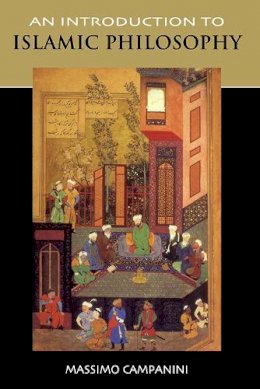13%OFF

Stock image for illustration purposes only - book cover, edition or condition may vary.
An Introduction to Islamic Philosophy
Massimo Campanini
€ 42.99
€ 37.50
FREE Delivery in Ireland
Description for An Introduction to Islamic Philosophy
Paperback. Provides a broad, comprehensive, and yet concise introduction to Islamic philosophy covering a vast subject area in a relatively short book. Translator(s): Higgitt, Caroline. Num Pages: 208 pages. BIC Classification: HPDC; HRH. Category: (UU) Undergraduate. Dimension: 216 x 139 x 12. Weight in Grams: 258. 208 pages. Provides a broad, comprehensive, and yet concise introduction to Islamic philosophy covering a vast subject area in a relatively short book. Cateogry: (UU) Undergraduate. BIC Classification: HPDC; HRH. Dimension: 216 x 139 x 12. Weight: 256. Translator(s): Higgitt, Caroline.
This broad, comprehensive, and yet concise introduction presents a reading of Islamic philosophy as it evolved in the Middle Ages, investigating how Islamic philosophers thought and what they thought about. The book is divided into two parts: the first part explores the epistemological foundations of Islamic philosophy and discusses the most important and penetrating interpretative paradigms proposed by the philosophers; the second part describes some of their major themes. Each chapter is organised chronologically and geographically, providing the reader with a lucid profile of the evolution of Islamic philosophical thought, with reference to specific themes within the broader framework of Islamic history. Throughout the author includes extracts of translations from primary sources, allowing the philosophers to speak for themselves. Rather than offering a complete history of the subject, the author aims to stimulate the reader to pursue the themes he outlines in the book: the ideas that were consistently the object of philosophical speculation among Medieval Muslim thinkers whose philosophy was rooted in Platonic and Aristotelian thought. This book is ideal for students wishing to trace the background to many ideas and thought processes governing contemporary Islamic thought.
Product Details
Publisher
Edinburgh University Press
Number of pages
208
Format
Paperback
Publication date
2008
Condition
New
Number of Pages
208
Place of Publication
Edinburgh, United Kingdom
ISBN
9780748626083
SKU
V9780748626083
Shipping Time
Usually ships in 5 to 9 working days
Ref
99-10
About Massimo Campanini
Massimo Campanini is Professor of Arabic Culture at the University of Milan. His publications include The Theory of Socialism in Egypt (1987), Islam and Politics (1999) and The Virtuous City of al-Farabi (1996).
Reviews for An Introduction to Islamic Philosophy
Campanini's book achieves everthing that a good introduction to Islamic Philosophy should achieve, and more. It is commendable for its clarity, sound argumentation, sensible organisation, and brevity. Its treatment of the relationship between philosophy and Islami - which defines this philosophical tradition - truly makes the book shine. The reader will close this short book with a firm understanding of what Islamic philosophy is at its core, a healthy appreciation for the Islamic philosophical tradition, and a desire to explore it further.
W. Craig Streetman, University of Kentucky in Journal of Shi's Islamic Studies Vol II No. 4 (2009) Campanini's book achieves everthing that a good introduction to Islamic Philosophy should achieve, and more. It is commendable for its clarity, sound argumentation, sensible organisation, and brevity. Its treatment of the relationship between philosophy and Islami - which defines this philosophical tradition - truly makes the book shine. The reader will close this short book with a firm understanding of what Islamic philosophy is at its core, a healthy appreciation for the Islamic philosophical tradition, and a desire to explore it further.
W. Craig Streetman, University of Kentucky in Journal of Shi's Islamic Studies Vol II No. 4 (2009) Campanini's book achieves everthing that a good introduction to Islamic Philosophy should achieve, and more. It is commendable for its clarity, sound argumentation, sensible organisation, and brevity. Its treatment of the relationship between philosophy and Islami - which defines this philosophical tradition - truly makes the book shine. The reader will close this short book with a firm understanding of what Islamic philosophy is at its core, a healthy appreciation for the Islamic philosophical tradition, and a desire to explore it further.
